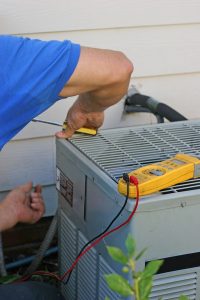 Your air conditioning system has gone through plenty this summer. The hot weather isn’t done yet, so you might have concerns about the AC’s continuing performance with all the stress it’s accumulated. It’s easy to make the mistake of thinking your air conditioner needs more refrigerant, at least “topped-off,” so it can get through the rest of the hot weather.
Your air conditioning system has gone through plenty this summer. The hot weather isn’t done yet, so you might have concerns about the AC’s continuing performance with all the stress it’s accumulated. It’s easy to make the mistake of thinking your air conditioner needs more refrigerant, at least “topped-off,” so it can get through the rest of the hot weather.
This is not true, and if you hear someone who claims to be an HVAC technician tell you it’s time for more refrigerant, run the opposite direction! There’s only one situation where you’ll need more refrigerant put into an AC, and it’s a repair job, not routine maintenance.
Refrigerant Is Essential for an AC, But It’s Not the AC’s Energy Source
The lowdown: refrigerant is not a fuel. An air conditioner does not consume refrigerant to run. The air conditioner consumes electricity to run.
“So what is refrigerant?” you ask. It’s good to know a bit about refrigerant and its job, since it can help you avoid disreputable “technicians” and understand better when an air conditioner needs repairs.
Refrigerant is a blend of chemicals that can easily move between liquid and gaseous state with only a minor input of energy. Its job in an air conditioner to create heat transfer—i.e. it allows the air conditioner to transfer the heat from inside a house to the outside. The refrigerant goes through a cycle where it evaporates indoors, absorbing heat energy, and then condenses outdoors, releasing heat energy. As the refrigerant shifts back and forth between hot gas and cold liquid form, it never dissipates.
This is the key takeaway for the next part: The amount of refrigerant in an air conditioner when it is installed should remain unchanged for the life of the system.
In other words, you will never need to have more refrigerant put into your air conditioner for as long as you own it. Except …
The Refrigerant Leak
The word “should” in that bolded statement is important, because an air conditioner won’t run perfectly for its entire life. Leaks can occur along the refrigerant lines. When this happens, the amount of refrigerant (called the AC’s charge) will start to drop. This is a serious repair issue: air conditioners are designed to operate on a specific charge, and if the charge drops it puts the system in jeopardy. The air conditioner will lose cooling capacity, cause indoor humidity to rise, have its evaporator coil ice over, and finally, the compressor will overheat and burn out. Usually, that’s the end of the line for an air conditioner.
Thankfully, if caught in time, a refrigerant leak is a basic fix for a Covington, GA, HVAC repair technician. The technician locates the leaks, seals them, and then puts in the amount of refrigerant that was lost to the leaks so the AC is back to its regular charge. This is the only time a technician should add refrigerant to your air conditioner.
If your AC is struggling in the heat, it may have a refrigerant leak. Call us to inspect the unit and see what needs to be done.
At Snellville Heating, Air and Plumbing, Your Comfort Is OUR Business. Schedule AC service with our expert technicians.




